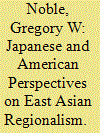| Srl | Item |
| 1 |
ID:
081499


|
|
|
|
|
| Publication |
2008.
|
| Summary/Abstract |
Regular convening of East Asian summits and rising concerns about the American dollar have heightened interest in Asian cooperation. Japan will necessarily play a central role in regional endeavors, and the United States must at least acquiesce if regional coordination is to progress. Among American accounts, the most theoretically elaborate and systematically comparative analysis is A World of Regions, while Remapping East Asia provides the most authoritative overview of recent developments. Japanese-language studies of East Asian regionalism agree that regional cooperation is far less institutionalized and rule-based in East Asia than in Europe, but they include a wider range of opinion about the desirability and feasibility of cooperation. Skeptics on the right warn that efforts to create a regional community would weaken the United States-Japan alliance, undermine universal values, and cede regional leadership to China. Optimists on the left counter that regional cooperation holds out the only hope for ameliorating nationalist conflicts. Most numerous are centrists arguing for active cooperation on economics and the environment, but only cautious moves on politics and security. Despite their caution, Japanese authors convey a sense that changes to the American-led global and regional order are occurring and likely will continue.
|
|
|
|
|
|
|
|
|
|
|
|
|
|
|
|
| 2 |
ID:
096599


|
|
|
|
|
| Publication |
2010.
|
| Summary/Abstract |
Business interests are overrepresented in Hong Kong's nominally democratic political institutions. Many in Hong Kong perceive this as evidence of the existence of "collusion between government and business," a phenomenon that has stirred public concerns in the city since its sovereignty transfer. Although anecdotal accounts abound, no systematic analysis has been conducted to evaluate the validity of this perception. In this article I use a rich firm-level dataset to offer the first systematic assessment of the effects of political connections on firm performance in Hong Kong. I define politically connected firms as firms that have stakeholders concurrently holding a seat on the Election Committee, a constitutional body that elects the city's chief executive. I found evidence, though not overwhelming, consistent with the "collusion" hypothesis: political connections do improve firm performance measured by return on equity and market-to-book ratio. The improvement is unlikely due to unobserved confounding factors such as firms' inherent ability. As for the origin of the political connections, the data show that a firm's economic power has little predictive value of its connections to the Election Committee. Rather, number of employees matters; firms that hire fewer workers were more likely to gain a seat on the 1997 Election Committee. This result may suggest that Beijing plays a more dominant role in the formation of political connections-that serve Beijing's co-optation needs rather than the interests of powerful firms that may have a desire to "capture" the state.
|
|
|
|
|
|
|
|
|
|
|
|
|
|
|
|
| 3 |
ID:
061220


|
|
|
|
|
| Publication |
Jan-Apr 2005.
|
| Summary/Abstract |
In the 1990s and into the new century, increased Japanese sympathy toward Taiwan and antipathy toward mainland China led to a series of moves to improve treatment of Taiwan, including enhanced transportation links, a higher level and frequency of official contacts, posting of a military attaché, and expressions of support for Taiwan's participation in regional and international organizations. Nevertheless, Japan remains firmly wedded to a One China policy that opposes both the use of force by the mainland and a declaration by Taiwan of independence from China. Japan's willingness to cooperate with the United States to defend Taiwan is increasingly in doubt. The sources of Japan's supportive but restrained policy include the decline of traditional ties with Taiwan, the increasing size of the mainland market, and above all a perception of security risks that ultimately diverges sharply from that of Taiwan. Serious cooperation in defense and diplomacy requires shared (or complementary) threats, not just shared adversaries.
|
|
|
|
|
|
|
|
|
|
|
|
|
|
|
|